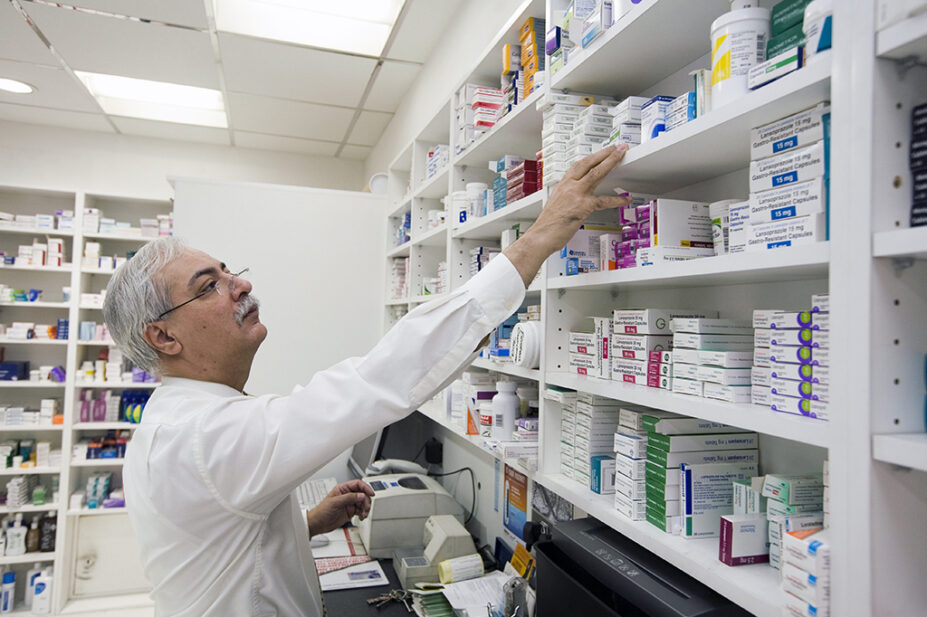
MARK THOMAS/SCIENCE PHOTO LIBRARY
Almost a quarter of people using community pharmacies say they have encountered shortages when trying to get their prescription medicine, a report from patient mouthpiece Healthwatch has found.
The report ‘Pharmacy: what people want’ is based on a poll of 1,650 adults and also found that older people were more affected by medicines shortages than younger patients, and women were more affected than men.
The research, carried out in November 2023, and published on 30 April 2024, revealed that 24% of respondents said they had experienced their pharmacy being out of the medicine or medicines they needed in the previous 12 months.
The report also found that a greater proportion of older people had experienced shortages than younger people, with 30% of those aged over 65 years saying they had a problem getting medicines in the past year because of shortages, compared with 15% of people aged 18–24 years.
The results also suggest that shortages affect women more than men, with 26% of women experiencing problems getting medicine because of shortages, compared with 22% of men.
“Our interviews with pharmacy users contained a lot of comments about shortages, underlining the negative experience this can be for people, including having a detrimental impact on their condition,” the authors wrote.
“People told us that medicine shortages cause them to have to go to another pharmacy or come back later. Others … felt the onus is on patients to source medication rather than pharmacies. In one case, someone told us they tried to find the medicine they needed but eventually gave up.”
They added: “The pharmacists interviewed were all empathetic about the issues shortages caused for people and were themselves frustrated by the inability to supply what patients need.”
A pharmacist in Sheffield, who was quoted in the report, said: “Going back from 1973 to now, this is by far the worst it’s ever been.”
In the report, Healthwatch, which aims to champion the views of health and social care service users, called on the government to carry out a review of the medicine supply chain “to ensure medicine safety and resilience”.
It also recommended that “where safe to do so, and in collaboration with patients, pharmacy teams should be given flexibility to make changes to medicines they dispense”.
Commenting on the report’s findings, James Davies, director for England at the Royal Pharmaceutical Society (RPS), said the figures “echo the growing concerns from RPS members about the impact of medicines shortages on patients and pharmacy teams”.
“The report adds to the growing calls on the government to help ease shortages by updating medicines legislation to enable community pharmacists to make minor amendments to prescriptions to adjust the strength or formulation,” he added.
“The RPS is examining the challenge of medicines shortages through a new advisory group and we will continue engaging with key stakeholders on what changes might help make a difference for patients.”
The Society also called for a review of the medicines supply chain in its manifesto, published ahead of a likely 2024 general election.
Commenting on the report, Janet Morrison, chief executive of Community Pharmacy England, said it was “no surprise” to see how much patients were being impacted by medicines supply issues.
“We have been pleased to support this important Healthwatch England work and endorse the report’s recommendations,” she said.
“Many of them align with our policy aims, including that government must urgently undertake a full review of the medicines supply chain, and that sustainable funding for pharmacy is absolutely critical. We will continue to work collaboratively with Healthwatch England and other organisations as we seek to secure both sustainable funding and future service developments for community pharmacies.”
In March 2024, The Pharmaceutical Journal reported that the number of times drug manufacturers reported shortages to the government increased by almost 70% between 2021 and 2023.
Healthwatch said it will publish a progress report “once enough time has passed for the primary care recovery plan to have had an opportunity to show impact”.


